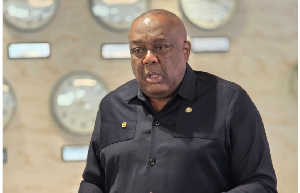In Ghana, the treatment of deceased individuals during funerals is a blend of creativity, cultural respect, and, at times, controversial practices. The tradition of honoring the dead with elaborate funerals is deeply ingrained in Ghanaian culture, often reflecting the deceased's profession or status in life.
However, some practices have raised concerns about the dignity and rights of the deceased, particularly when bodies are laid in state in ways that some may view as disrespectful or even abusive.
One of the most fascinating aspects of Ghanaian funerals is the custom of designing coffins to reflect the profession or passion of the deceased. For example, doctors' or nurses' coffins may be shaped like syringes, while fishermen's coffins are designed to look like canoes or fish. Teachers' coffins are shaped like books or blackboards; farmers' coffins resemble farm tools or produce.
These creative coffins serve as a tribute to the deceased, celebrating their life and work in a way that is visually striking and culturally significant. However, in a lot of cases, creativity crosses the line. The creativity in honoring the dead sometimes crosses into controversial territory.
There have been instances where the bodies of the deceased are laid in state in ways that are obviously undignified or disrespectful. For instance, a preacher could be laid in state, standing upright, positioned behind a pulpit with an open Bible in front. Chefs have been posed holding a ladle or even placed in a mock kitchen setting as if they were preparing a meal.
In extreme cases, bodies have been manipulated in ways that could be perceived as abusive, such as posing them in unnatural positions or using props that trivialize the sanctity of death.
These practices, while intended to honor the deceased, often lead to the mishandling of the body and can be seen as a violation of the dignity that should be afforded to every individual, even in death.
Even the dead have rights, so the treatment of dead bodies in some of these scenarios raises serious human rights concerns. Both Ghanaian and international laws recognize the need to treat the dead with respect and dignity.
The Public Health Act, 2012 (Act 851) includes provisions to ensure the proper handling of dead bodies to protect public health and dignity. Mishandling a body could be considered a violation of this act, particularly if it endangers public health or disrespects the deceased.
Sections of the Criminal Offenses Act, 1960 (Act 29) could be interpreted to prohibit the desecration of a corpse, making it illegal to treat the body of the deceased in a way that could be considered disrespectful or abusive.
The 1948 Universal Declaration of Human Rights (UDHR), though primarily focused on the rights of the living, emphasizes the inherent dignity of all human beings, a principle that extends to the treatment of the dead.
The Geneva Conventions (1949), often associated with wartime, include provisions for the respectful treatment of the dead, emphasizing the need to handle bodies with care and dignity.
It is crucial for Ghanaian authorities and institutions to address these concerns and ensure that the rights and dignity of the deceased are upheld. Authorities should ensure that the Public Health Act and the Criminal Offenses Act are enforced to prevent the mishandling of bodies.
There is a need for public awareness campaigns to educate communities on the importance of treating the dead with respect and the legal implications of failing to do so.
While honoring cultural practices, it is essential to balance creativity with respect for the deceased's dignity, ensuring that no practices violate their human rights.
Essentially, as Ghana's unique funeral customs reflect a deep respect for the deceased's life and work, it is important to ensure that these practices do not cross the line into disrespect or abuse. By upholding the dignity of the dead through respectful treatment and in accordance with the law.
We must all be careful because "ignorantia juris non excusat," that is to say, "ignorance of the law excuses not."
We can still do funerals in a way that honors both tradition and human rights.
Opinions of Tuesday, 20 August 2024
Columnist: Dumenu Charles Selorm















